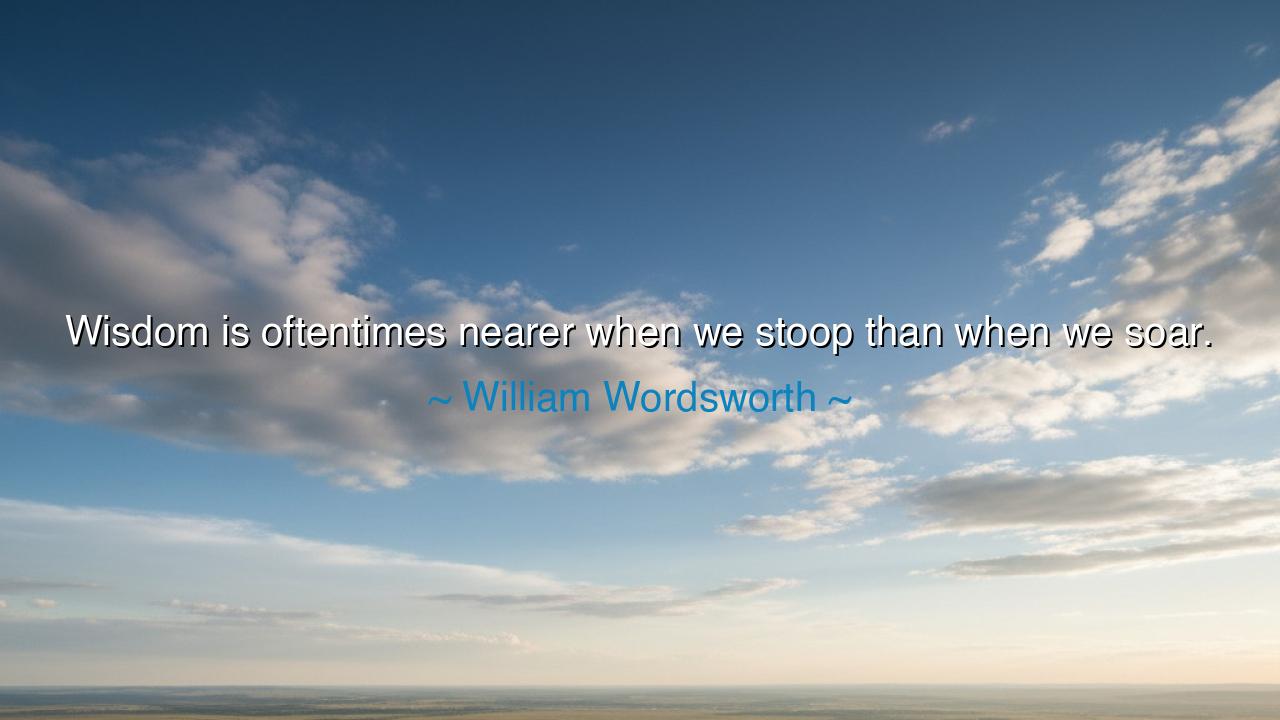
Wisdom is oftentimes nearer when we stoop than when we soar.






William Wordsworth, seer of nature’s truth, gave us this immortal line: “Wisdom is oftentimes nearer when we stoop than when we soar.” In these few words, he tears the veil from human pride. For men often think that to rise, to conquer, to soar into heights of ambition, is the way to wisdom. Yet Wordsworth reminds us that the truest wisdom is found not in the skies of arrogance, but in the humble soil where life grows, where the soul bends low to listen.
To stoop is to embrace humility, to lower oneself in reverence before the simple and the small. It is in kneeling beside a child, or in bowing to the earth, or in yielding to the quiet rhythms of the heart, that the greatest truths are revealed. To soar, by contrast, is often to lose sight of the ground, to be blinded by clouds of pride and distance. Wordsworth’s wisdom is this: that life’s most sacred lessons come not from lofty heights but from simple nearness, from stooping low enough to see what truly matters.
History bears witness to this. Mahatma Gandhi, though armed with neither armies nor wealth, stooped in humility to walk barefoot with the poor, to spin his own cloth, to live simply. And in this stooping, he discovered a wisdom that empires had forgotten—that power lies in truth, that strength lies in peace. When the British Empire soared in pride and conquest, Gandhi stooped, and in doing so, brought a nation to freedom.
Even in the life of Christ, this principle shines. He stooped to wash the feet of his disciples, teaching that greatness is not in soaring above others, but in serving them. He stooped to lift the lowly, to heal the broken, to embrace the rejected. And from these acts of humility flowed a river of wisdom that has shaped centuries. Wordsworth’s words echo this eternal truth: wisdom lies nearer when we lower ourselves in compassion than when we exalt ourselves in glory.
O children of tomorrow, remember this counsel: seek not always to soar, lest the winds of pride carry you away. Learn instead to stoop—to bow before the humble, to listen to the earth, to honor the small and the meek. For it is in these lowly places that you will find the jewels of wisdom, closer than you dreamed, radiant enough to guide your steps far better than the distant stars.






KKai
I’m intrigued by the metaphorical contrast between ‘stooping’ and ‘soaring.’ Does stooping imply a form of attentiveness or humility that is necessary for growth, while soaring represents ambition that can blind us to subtle truths? I’d like to explore whether personal failures or moments of vulnerability are often the catalyst for wisdom. Could it be that by lowering ourselves to face challenges directly, we actually gain more insight than by aiming for heights we cannot yet reach?
NHHai Dong Nguyen Hua
Could this idea be interpreted as a critique of overconfidence or arrogance? It feels like a reminder that wisdom often resides in everyday experiences and the insights of ordinary people. I wonder if modern education or leadership practices undervalue this approach. How might society change if more people focused on listening, observing, and learning from what is immediately around them rather than constantly chasing recognition and status?
TNLe Thao Ngan
I find this perspective both comforting and challenging. It seems to suggest that wisdom is accessible to anyone willing to pay close attention and approach life with humility, rather than only to those who reach great heights. But how do we balance striving for success with this notion of stooping to learn? Is there a risk of complacency if we take this too literally, or does it advocate a deeper, more mindful way of living?
TNTrung Nam
This quote makes me wonder if true understanding comes more from humility and attentiveness to the small details of life rather than from grand ambitions or lofty ideals. Could it be that the moments we overlook as mundane hold deeper lessons than the moments we pursue with high aspirations? I’m curious about how this idea might apply to modern life, where achievement and status are often celebrated over quiet reflection and careful observation.